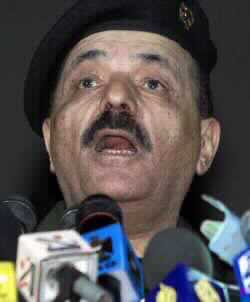- Author:
& News Agencies - Section:
WORLD HEADLINES
- Hajj & Umra WORLD HEADLINES
Iraqi vice president says U.N. inspectors can visit palaces

Iraq's vice president said in an interview published on Saturday that Baghdad was ready to allow U.N. weapons inspectors to visit eight presidential palaces, a key sticking point with the United States. "As far as we are concerned, the inspectors can search and inspect however and where ever they would like," Taha Yassin Ramadan told the German Der Spiegel newsmagazine in response to a question as to whether inspectors could also visit the presidential palaces.
Iraq agreed at meetings in Vienna on September 30 and October 1 that inspectors could examine President Saddam Hussein's eight palace compounds, subject to special procedures in a 1998 memorandum approved by the U.N. Security Council.
Washington has argued that those conditions do not amount to unfettered access.
It was not clear whether Ramadan's remarks meant that Iraq was now willing to abandon the procedural restrictions on palace access set out under the 1998 memorandum.
Iraq said on Friday it was ready to receive U.N. arms inspectors on October 19. But it ignored demands from chief U.N. inspector Hans Blix on how to facilitate unrestricted access to suspected weapons sites.
The inspectors are charged with finding and neutralising any Iraqi nuclear, biological or chemical weapons programs or ballistic missiles.
SIGNIFICANT DIFFERENCES
The United States has argued that the previous inspection regime had permitted Iraq to hide weapons, especially in eight so-called "presidential palaces", and to block or evade legitimate inspections.
Ramadan characterised Iraq's recent position on inspectors as one without any limitations.
"When our friends in the Arab world and in Europe asked us to allow a return of the inspectors, we approved it without any conditions or limitations," Ramadan told Der Spiegel.
Ramada also reiterated Baghdad's position that it did not have any weapons of destruction.
A Der Spiegel spokesman said the interview was carried out in the middle of this week, but was unable to say what day.
U.S. President W. George Bush criticised Iraq this week for not allowing access the palaces.
"Eight so-called presidential palaces were declared off-limits to unfettered inspections," he said. "These sites actually encompass 12 square miles, with hundreds of structures both above and below the ground where sensitive materials could be hidden."
British Prime Minister Tony Blair, who has taken a tough line with the United States against Iraq, last week also demanded access to the palaces.
"It is no good allowing inspectors access to 99 percent of Iraq if the weapons of mass destruction are actually located and stored...in the remaining one percent," Blair said.
With full congressional support for a military strike in hand, Bush turns his attention next week to the United Nations where members want him to compromise his hard-line approach to prying Iraq open to unfettered arms inspections.
The U.N. Security Council decided on Friday to hold an open debate on Iraq on Wednesday, although a resolution on possible military action will probably not be introduced by then.
PHOTO CAPTION
Iraqi Vice President Taha Yassin Ramadan is pictured on September 22. REUTERS/Stringer
Related Articles
 Hajj virtues
Hajj virtues
-
School of Faith in Ten Days of Thul-Hijjah
The believing human self needs strong provocations in order to awaken whenever it is enveloped by laziness in...
-
The Status of Hajj in Islam
Hajj is the fifth pillar of Islam; Allah, The Exalted, ordained it in the ninth year after Hijrah (the Prophet's,...
-
School of Faith in Ten Days of Thul-Hijjah
The believing human self needs strong provocations in order to awaken whenever it is enveloped by laziness in relation...


 Home
Home Discover Islam
Discover Islam Quran Recitations
Quran Recitations Lectures
Lectures
 Fatwa
Fatwa Articles
Articles Fiqh
Fiqh E-Books
E-Books Boys & Girls
Boys & Girls  Hajj Rulings
Hajj Rulings Hajj Fatwas
Hajj Fatwas












